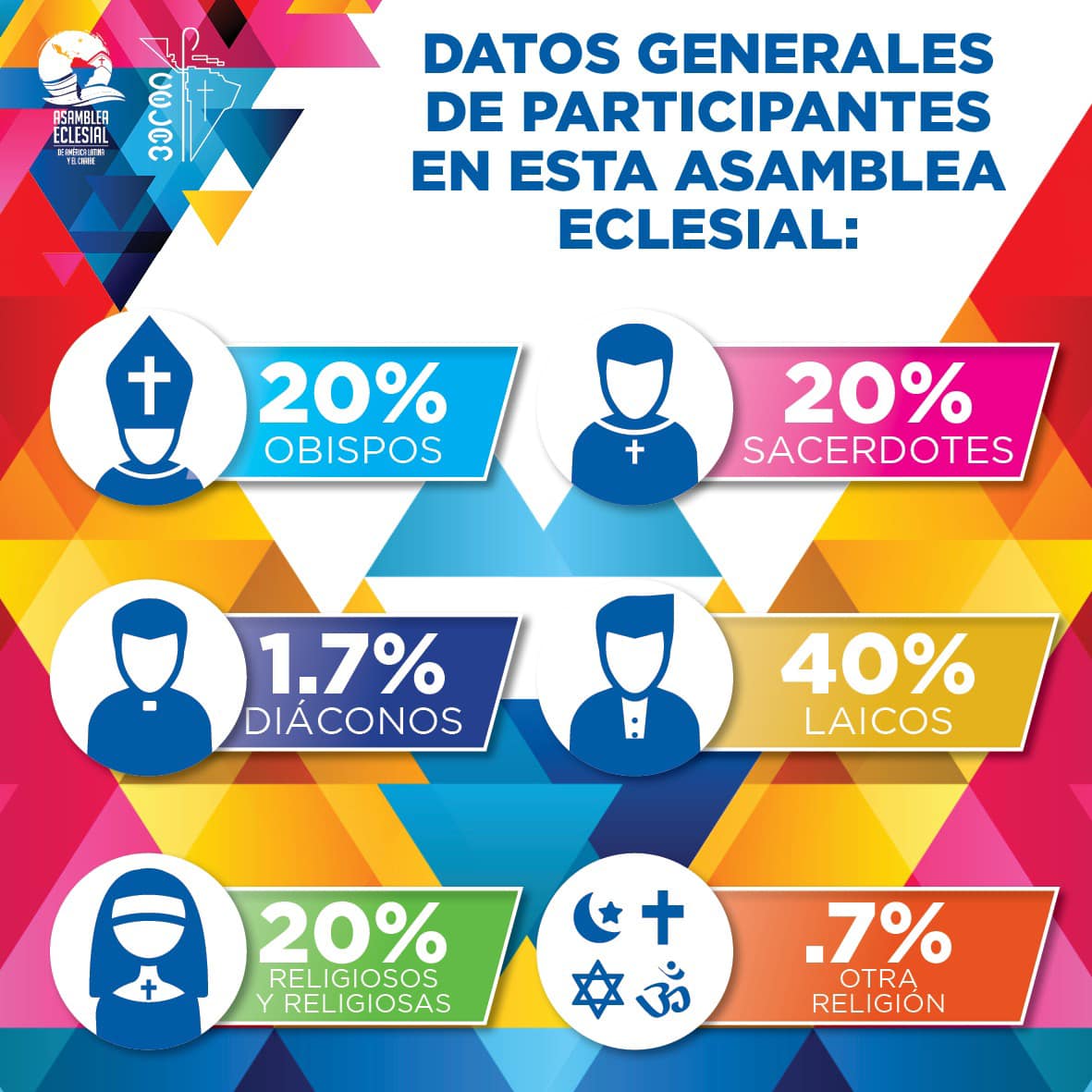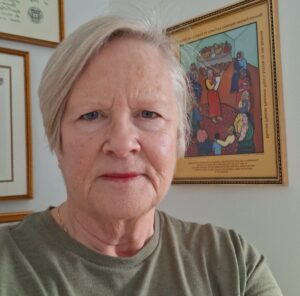Five moments from the historic Latin American Ecclesial Assembly

Promoting the active participation of women in Church ministries, governance, discernment and ecclesial decision making emerged as one of 12 key challenges in the first ever Ecclesial Assembly of Latin America and the Caribbean.
Taking place near the Basilica of Our Lady of Guadalupe in Mexico City and virtually during the last week in November, the assembly was the first meeting of its kind in the global church to discuss the needs of the continent in a synodal way. This assembly of 1,000 people followed scores of listening consultations and thematic forums in which 70,000 people participated, highlighting the Latin American Church as an unprecedented global leader in synodality.
Here are five takeaways or moments from this historical ecclesial assembly, during which the conversation about women’s leadership roles in the Church was advanced, as well as the need for a synodal Church that goes forth in mission to the peripheries.
- A meeting of the People of God was achieved. Whatever its limitations, the Ecclesial Assembly of Latin America and the Caribbean was a huge step forward, not only for the continent, but for the global Church. It signals that Pope Francis’ vision of a synodal Church does not stop with parish or regional consultative sessions, but that it can be imagined as leading to new continental ecclesial gatherings and models that include bishops, priests, religious, deacons, lay women and men, as well as youth representatives. Synodality was affirmed as the essence of the Church allowing all the People of God to walk forward together. Women comprised 36% of the ecclesial assembly in recognition that all the baptized are called to serve as missionary disciples going forth into the peripheries for the renewal of our Church in the third millennium.
- The assembly discerned 12 pastoral challenges for the coming decade so as to continue implementing the Latin American episcopal plan Aparecida in parishes, communities and Catholic social action efforts. The third pastoral challenge reads: Promote the active participation of women in Church ministries, governance, discernment and ecclesial decision making. Other challenges include a call for Increased formation in synodality to eradicate clericalism and to renew the concept and experience of the Church as the People of God in light of scripture and Vatican II. The pastoral challenges also name youth, the cry of the poor and the excluded, the victims of social and ecclesial injustices, the human rights of native and Afro-descendent people, the defense of the dignity of life, integral ecology and and promoting a personal encounter with Jesus Christ incarnated in the reality of Latin America. (The 12 challenges are translated into English below.)
- Throughout the week, women and men were invited to share their thinking and their personal testimonies about the pastoral challenges and needs of their regions. Here is the link to presentations on synodality and racial and cultural diversity by women leaders Sister Laura Vicuña and Sister María Suyapa Cacho and theologian Birgit Weiler (in Spanish or Portuguese). Among the many women who had a voice at this assembly was Brazilian catechist and ministry leader Doris Vasconcelos, who traveled with Discerning Deacons to Rome in October. During her testimony, Doris said, “We feel called to collaborate with God and to seek pathways and encouragement from a synodal Church, a Church that lives with an abundance of unity and universality and that recognizes the possibility of new ministries and the full participation of women.” Here’s the link to her testimony, which was translated from Portuguese into Spanish, which begins around minute 9.
- Cardinal Álvaro Ramazinni of Guatemala celebrated the daily Eucharistic Liturgy on November 25 and invited all present to participate in a gesture symbolizing the dignity of women. After his final blessing, he invited the women up to the altar to offer a blessing to the bishops, priests and deacons. “The gesture comes from our hearts as pastors and comes from expressing the equality that exists between baptized men and women. The apostle Paul said it and so he taught us,” said Cardinal Ramazinni. He added that the blessing the women offered the men expresses the common commitment to the synodal journey and for the elimination of all violence against women. A group of about 20 women then offered their blessing to the clergy. Here’s the link to see this moving gesture, beginning at 1 hour, 13 minutes.
- Check out the video recording of many photos and images of the first ecclesial assembly, paired with the popular assembly theme song, “Todos somos discipulos misioneros en salida” (We’re all missionary disciples going forth). Here’s the link to the assembly’s concluding message written in Spanish.
The ecclesial assembly and all the consultations leading up to it was seen as a kairos moment, a time of abundant graces and imagination, as the Latin American Church experiments with new synodal practices of listening sessions, thematic forums, small discernment groups, large assemblies, and prayerful liturgies. It is a recovery of the early Christian Church in the Acts of the Apostles and for its first 1,000 years. Women made major contributions to this ecclesial assembly, and while there is still much to learn, templates for synodality have been created and concrete experiences have now taken place which the Latin American Church and the global Church will continue to reflect on as the synodal journey continues.
The pastoral challenges of the Ecclesial Assembly of Latin America and the Caribbean
- Recognize and value the protagonism of the youth in the ecclesial community and in society as agents of transformation.
- Accompany the victims of social and ecclesial injustices with processes of acknowledgment and reparation.
- Promote the active participation of women in Church ministries, governance, discernment and ecclesial decision making.
- Promote and defend the dignity of life and of the human person from conception to natural death.
- Increase formation in synodality in order to eradicate clericalism.
- Promote the participation of the laity in spaces of cultural, political, social and ecclesial transformation.
- Listen to the cry of the poor, excluded and discarded.
- Reform the formation plan of the seminaries by including themes such as integral ecology, native peoples, inculturation and interculturality, and the social teachings of the Church.
- Renew, in light of the Word of God and Vatican II, our concept and experience of the Church as the People of God, in communion with the richness of its ministries, which avoids clericalism and favors pastoral conversion.
- Reaffirm and give priority to an integral ecology in our communities, based on the four dreams of Querida Amazonia.
- Promote a personal encounter with Jesus Christ incarnated in the reality of the continent.
- Accompany the native peoples and Afro-descendants in the defense of life, land and cultures.




